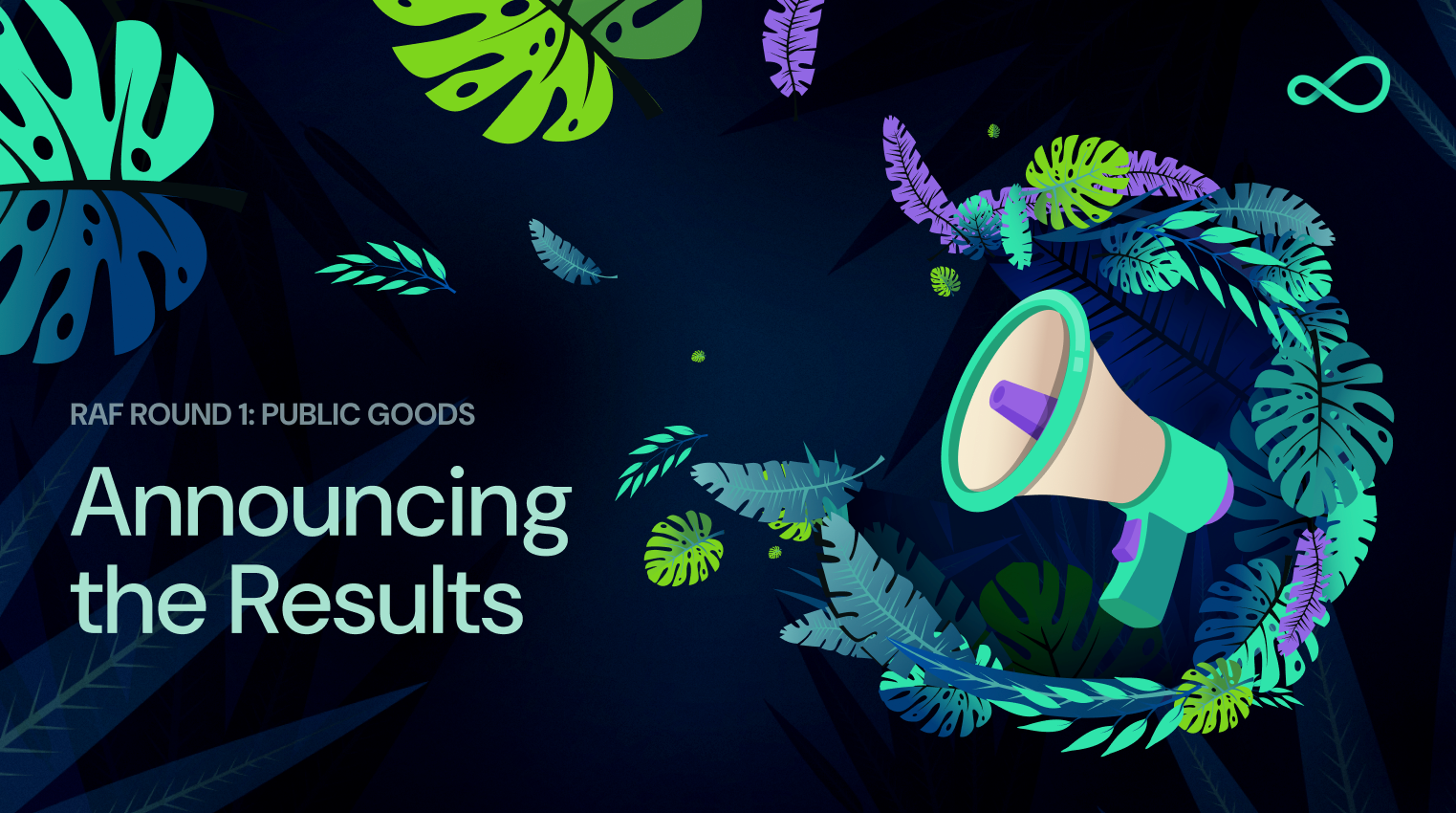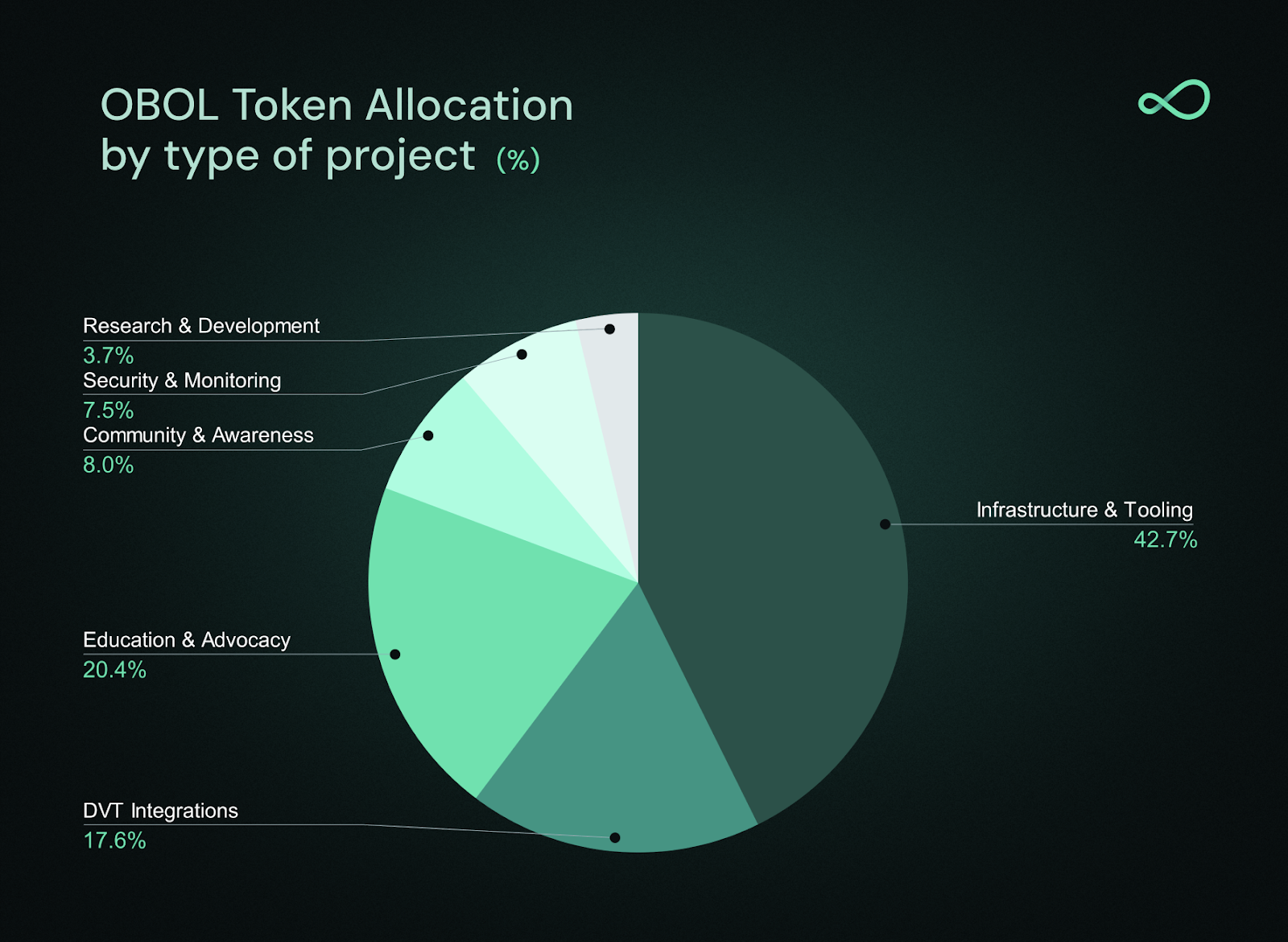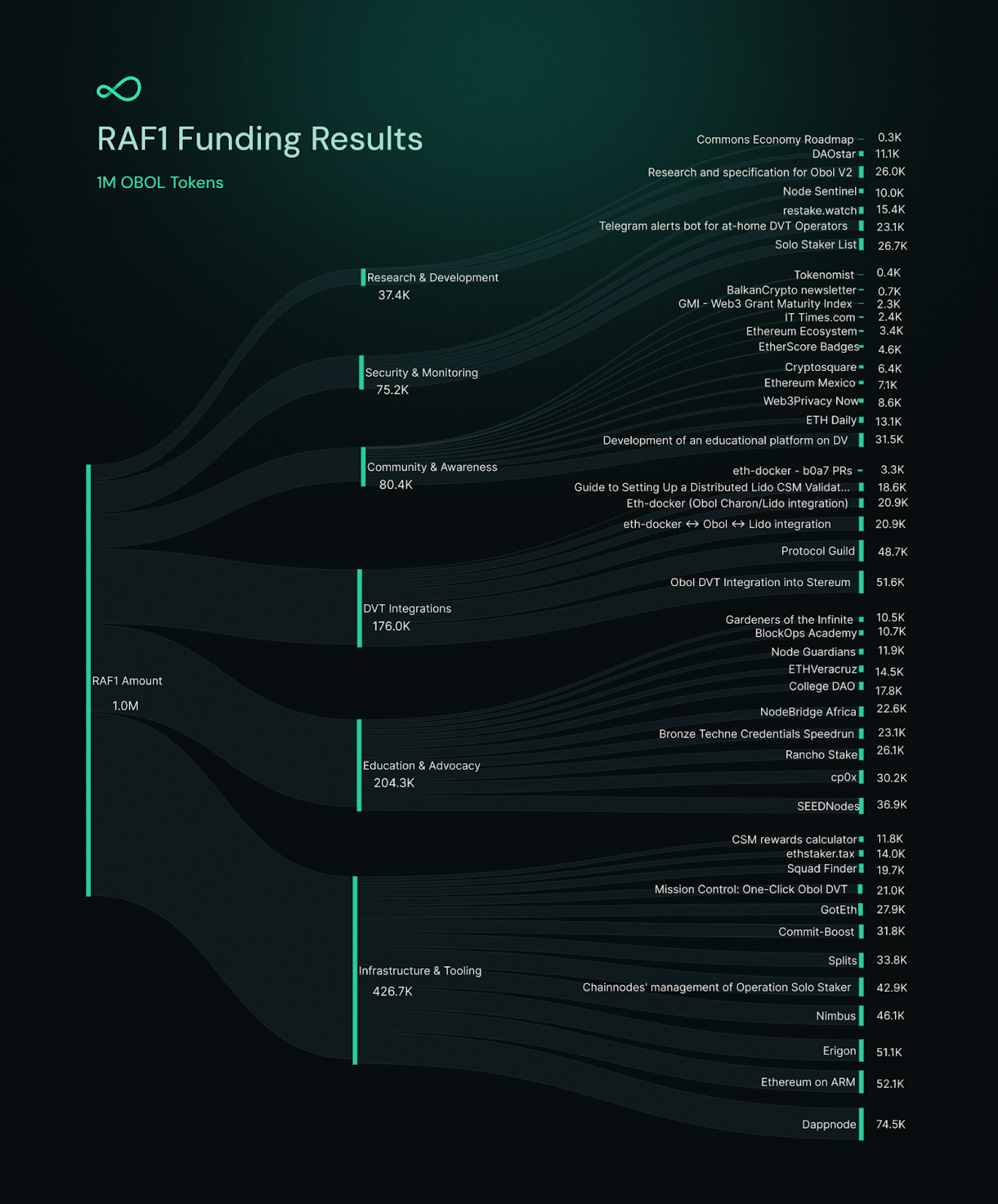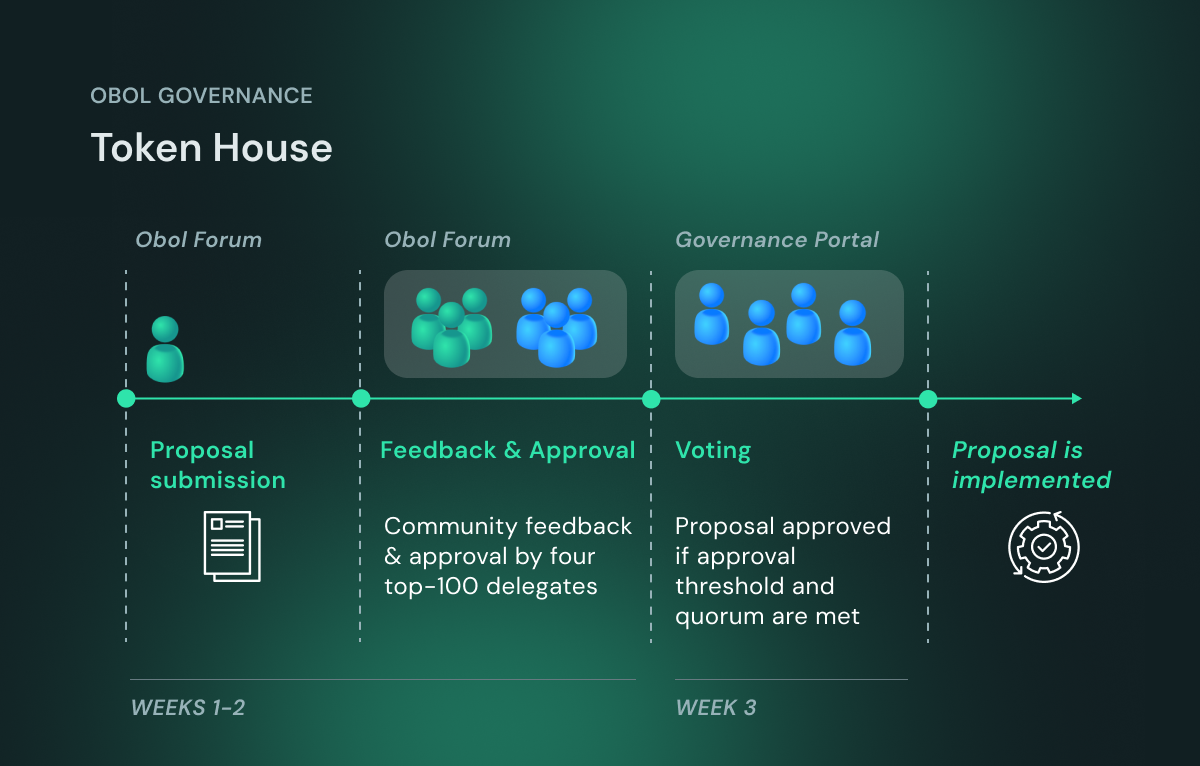The Results of Obol's First Retroactive Funding Round
We're thrilled to announce the results of the Obol Collective's first Retroactive Funding Round (RAF1). After a week of evaluation and voting by delegates, 46 projects were chosen to receive funding.

We're thrilled to announce the results of the Obol Collective's first Retroactive Funding Round (RAF1). After a week of evaluation and voting by delegates, 46 projects were chosen to receive funding. 1M OBOL Tokens will be paid out using quadratic funding, to projects that demonstrated significant impact in strengthening and promoting the Obol Collective’s Decentralized Operator Ecosystem and its ability to scale Ethereum and other decentralized infrastructure networks.
This post also announces the launch of the Token House - the next step in Obol’s dual-governance system. This marks the beginning of Obol’s journey toward decentralization.
Impact Metrics and Evaluation
During the voting period (February 10th - February 17th), our top 100 delegates carefully evaluated each project based on impact metrics.
- For projects or individuals that increased accessibility, participation, or value within the Obol Decentralized Operator ecosystem, impact metrics included staked assets and user growth.
- For projects or individuals which contributed to the development or improvement of open-source tools, protocols, or systems, impact metrics included: Number of users, downloads, distributed validators, lines of code or pull requests, bugs fixed, features implemented, etc.
Results Overview
A total of 46 projects successfully applied to the first round. Delegates decided how the Obol Collective should fund them by allocating votes, with the quadratic funding mechanism ensuring fairness in the final allocation. On average, 21.55k OBOL Tokens were awarded per project with 43.5% of the projects being awarded above the average. This is possible thanks to quadratic funding, which rewards the number of delegates voting for a project more than the number of absolute votes.
Quadratic funding is basically a general-purpose donation matching scheme where the question of what projects are eligible is itself decided in the mechanism: the more distinct people donate to something, the more likely it's a legit public good, so the higher the matching ratio
— vitalik.eth (@VitalikButerin) December 25, 2019
As it is visible in the graph below, the majority of the tokens in round one were allocated to infrastructure and tooling.

The overall distribution to projects is visualized in the following diagram. To see the full list of rewarded projects, please visit the public spreadsheet here.

The three projects with the most votes, and thus the highest amount of funding, were:
#1: Dappnode
Dappnode is Free Open Source Software (FOSS) that allows anyone to run decentralized infrastructure. Dappnode integrated Obol's middleware for Lido's SDVT and Etherfi's Operation Solo Staker. It has created the package and included Obol in the Dappstore, where many users used it to create their DV setups.
- Key Impact: 16,290 validators on Dappnode (self-reported as per their graffiti)
- Technical Contribution: Obol package & Ejector for SDVT users
We’re excited to continue the partnership with Dappnode to expand the use of Obol DVs in the home staker ecosystem.
#2: Ethereum on ARM
This project enables users to run DV nodes on low cost devices. Automated deployment reduces complexity and ensures validator clusters are resilient, and have minimised slashing risks. In the first stage (already completed) they ran a cluster of 4 Obol nodes on Holesky.
- Key Impact: Integration of Obol into Ethereum on ARM
#3: Stereum
Stereum is an open-source software solution designed to simplify the deployment and management of Ethereum nodes. This implementation includes a one-click installer enabling users to deploy a fully operational Ethereum node with the Obol Charon client pre-installed, configured, and ready for immediate use. The Stereum team commits to open source, maintaining Stereum Obol integration and continuously auditing the software with 3rd parties.
To see the full list of rewarded projects, please visit the public spreadsheet here.
Community Feedback
Feedback was collected from delegates via a survey, and from projects on the forum. This feedback will help shape future funding rounds. But with only 6 projects and 13 delegates providing feedback, this in itself is an area for future improvement.
Generally projects indicated satisfaction with the application process and the assistance from the Obol team. Delegates also indicated satisfaction with the experience of the RAF app, although highlighted some technical issues using SAFE wallets and other wallet challenges. We will provide feedback to Gitcoin and work with them on the next release of their retroPGF app, which will improve the UX of our next round.
Other feedback indicated that the deadlines would be better on weekdays, rather than weekends, and could be communicated better. However, it was also indicated that the direct contract from the Obol team was very helpful.
Delegates indicated difficulty in validating unknown projects, especially when provided with limited information around impact metrics. There were concerns that some of the projects did not make a real contribution, but may receive some funding, and an entry threshold should be implemented to be able to apply. Impact metrics are an ongoing experiment, and we will continue to refine them as we move into future RAF rounds.
Additionally, there was some indication that the quadratic voting mechanism was not clearly explained, and that access to real-time voting results would have been useful.
This feedback will be kept in mind for future RAF funding rounds, as we aim to boost transparency, fairness, and effectiveness going forward.
Next Steps for RAF1
All selected projects will now enter the KYC process if it is the first time they interact with the Obol Association, with token distribution targeted for completion by the end of March 2025.
To stay up to date on the latest events on the Obol RAF calendar, click here.
Looking Ahead: Future RAF Rounds
This successful completion of RAF1 marks just the beginning of our commitment to supporting public goods in the Obol ecosystem. The insights gained from this round will help us refine our approach for future funding rounds, ensuring we continue to effectively support projects that advance our mission of scaling decentralized infrastructure networks.
We're already planning improvements for future rounds based on community feedback and lessons learned. While maintaining our core principles of transparency, fairness, and impact-based rewards, we'll be working to make the process even more efficient and accessible.
Token House
The Token House is a key component of Obol’s Dual-Governance system, empowering OBOL Token holders to actively participate in decision-making for the Obol Collective. It plays a crucial role in shaping the future of the ecosystem by overseeing changes such as contract upgrades, treasury allocations, and strategic direction.
The Obol Association acts as a steward of the Obol Collective, ensuring that the Token House fulfills its mandate to guide the Collective toward its long-term vision. This governance structure is designed to foster innovation, self-expression, and freedom, recognizing that building a robust, decentralized system takes time and collective effort. The Association is discussing the path towards full decentralization, in line with the north star of the project, and will be ready for discussion soon.
Who and how can a person participate?
Anyone can submit a proposal in the forum and anyone can comment. OBOL Token holders are responsible for approving, deliberating, and voting on various Obol Collective governance proposals. All delegates can vote, not just the top-100 as is the case for the Obol RAF. A proposal just needs endorsement on the forums from 3 of the top-100 delegates.
Feb 20th marks the beginning of the first three-week governance cycle, for proposals to the Token House. Any governance proposals not relating to RAF and defined in the Governance documentation can be submitted to the Token House for discussion and voting by delegates.
After a two-week submission and discussion period, voting begins on March 6th, for one week. To stay up to date on the latest events on the Obol governance calendar, click here.
- Feb 20th - March 5th: Proposals for cycle 1
- March 6th - 12th: Voting for cycle 1
- March 13th: The next three-week cycle begins

To learn more about the Token House, please read the docs page, the governance page of the Obol website, or visit the forum.
Get Involved
We want to extend our heartfelt thanks and congratulations to all the projects that participated in our first RAF round, as well as our dedicated delegates who carefully evaluated each submission, and the entire Obol community for their engagement in this process.
The success of RAF1 demonstrates the strength of our ecosystem and the power of retroactive funding in supporting public goods. Together, we're building a more robust and decentralized future for blockchain infrastructure.
Stay tuned for more updates as we move into the distribution phase and begin planning for future funding rounds!
- Visit raf.obol.org to view detailed results and project submissions
- Join our Discord to participate in discussions about future rounds
- Follow us on Twitter for the latest updates and announcements
